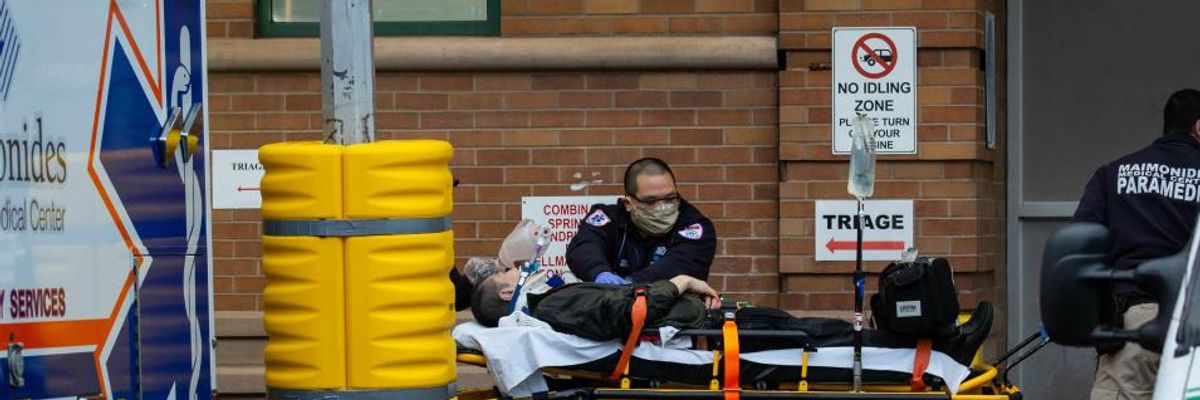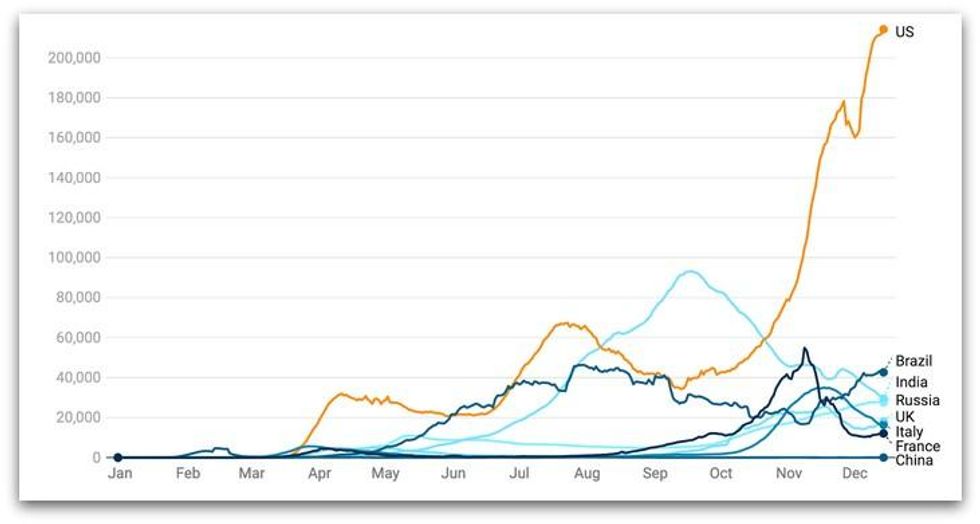We have reached a deadly milestone: 300,000 Covid-19 deaths in the United States. That's one hundred times as many people as died on 9/11. More people died from Covid-19 last Wednesday, in fact, than died on 9/11. Friday, too.
"To stop the dying, we must act as if each of our lives depended on it."
300,000 deaths: that's like losing the entire population of Pittsburgh. Or Cincinnati. Or Orlando. If those cities had fallen to dirty bombs, society would have changed forever. This virus, compounded by government negligence and a lack of social cohesion, was the dirtiest bomb of all.
Progressives, of all people, should have a visceral understanding of all this pain and loss. They--we--are supposed to practice the politics of empathy. Why aren't more of us demanding action to save lives now?
We must remain aware of the ongoing death toll and press elected officials to take immediate steps to save lives. Those steps should include:
1. Use federal resources to manufacture vaccines and lifesaving medicines.
Progressives should call on the government to use the rights granted to it by the Bayh-Dole Act of 1980 to override pharmaceutical patents and make all needed medications available to everyone in this country. Nor should we overlook the devastating impact pharmaceutical patents have on people in other parts of the world. Lifting these government-granted monopolies will save lives around the world, as well as at home.
The government should also use its legal authority to oversee and, if necessary, directly engage in the manufacture and distribution of personal protection equipment to everyone who needs it. (Which, to be clear, is pretty much everyone.)
2. Provide medical care for everyone during the pandemic.
The best way to save lives and slow the spread of the disease is by ensuring that everyone has medical care for the duration of the crisis. (They should have it at all times, but that's a different debate.)
The Emergency Health Care Guarantee Act, introduced by Sen. Bernie Sanders and Rep. Pramila Jayapal, would do exactly that. Although political considerations shouldn't matter in an emergency, the idea is popular. It's supported by 73 of voters, according to one poll, including 58 percent of Republicans, and is backed by more than 30 grassroots organizations. (More here.)
3. End the open enrollment rules that prevent people from getting coverage.
Both Medicare and the Affordable Care Act arbitrarily limit enrollment to certain times of the year. If you don't sign up during the specific enrollment periods, you cannot get insurance coverage until the following year.
Open enrollment for 2021 under the Affordable Care Act was limited to November 1-December 15 of this year.
Medicare recipients could only change their coverage options between October 15 and December 7 and, like ACA enrollees, are asked to choose from a dizzying array of options. People turning 65 must enroll within a complex, mandatory period. Failure to meet this deadline can result in permanently higher premiums for Part B (medical) coverage.
These restrictions are designed to limit "adverse selection"--that is, people buying health insurance when they need immediate medical care. This is a harsh form of social engineering whose primary purpose is to protect profit margins for private insurers. It wouldn't be necessary if we had universal, single-payer health coverage. It's an especially bad idea during a pandemic. And it makes no sense for Medicare, whose stated goal is to cover all seniors and people with qualifying disabilities.
4. Eliminate deductibles, as well as copays, as of January 1.
A new benefits year is about to start for millions of people who receive their health insurance through their employers or the ACA exchanges. That means they will once again have to meet their insurance deductibles. They'll have to pay for their medical care themselves until they do. As I explained in March 2020, that will make the pandemic worse. Congress should act to eliminate these out-of-pocket costs for the duration of the pandemic.
Unfortunately, instead of backing this lifesaving approach, Congressional Democrats have a proposal that would leave millions of people unprotected and impose needless expenses on millions more. That's the wrong approach, and it costs more than it would cost to provide unemployed workers with coverage through Medicare. Progressives should demand that Congress drop this givewaway to health insurance corporations and cover out-of-pocket costs directly. (Diane Archer and I explain more here.)
5. Provide paid sick leave for all workers.
This country's disgraceful record on sick leave is also increasing the death toll. (This study of disease transmission among construction workers in Texas is a case in point.)
6. Use government resources to deliver medical care.
Hospital intensive care units are at or near full capacity around the country. What are we doing to ensure that everyone who needs an ICU bed will have one in the weeks and months to come? Why isn't the left calling on the government to deploy all available resources, including military medical tents, to meet this need?
7. Extend the eviction moratorium to save lives.
In a landmark analysis, a group of public health and health policy experts studied expiring and continuing eviction moratoriums in 44 states. They found that allowing these moratoriums to expire in 27 states led to an additional 433,700 COVID-19 cases--and an additional 10,700 deaths. In the 21st century's algebra of terror, that's another three and a half 9/11's right there.
Congress isn't planning to extend a moratorium on evictions--even though it would cost the federal government nothing to do so. Progressives should push them on this issue.
8. Expand access to mental health services.
At-risk groups are experiencing more severe depression symptoms as a result of COVID-19, according to a British study. Why aren't we demanding an expansion of mental health services to minimize suicides and help people cope during the pandemic? Private health insurers typically restrict access to mental health coverage. The government should intervene to overcome those restrictions, either through regulation or by paying for them directly.
9. Expand childhood education to save lives in the future.
In a shocking and under-reported finding, a study in the Journal of the American Medical Association (JAMA) concluded that US schoolchildren may experience a lifetime loss of educational achievement that will lead to 53 million years in total lost years of life as a result of the pandemic.
We already know that lower-income children are disproportionately suffering from a lack of access to online learning. Progressives should be calling for an infusion of education funds to offset this harmful--and even deadly--shortfall in education.
Conclusion
We need a left that can meet the urgency of this crisis. The old ways--of centrism, a smallness of vision, the belief that change must always be slow and incremental--will fail us in our hour of need. To stop the dying, we must act as if each of our lives depended on it.
Because they do.


